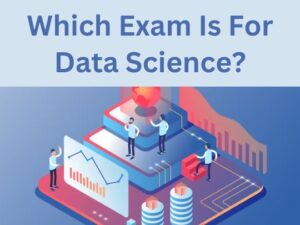The qualifications for data science can vary depending on the specific job requirements and the organization you’re applying to. However, here are some common qualifications and skills that are often sought after in the field of data science:
Education: A bachelor’s degree in a related field such as computer science, statistics, mathematics, physics, or engineering is typically required. Many data scientists also have advanced degrees, such as a master’s or Ph.D., although it is not always mandatory.
Learn the core concepts of Data Science Course video on Youtube:
Strong Mathematical Foundation: Data science involves working with complex algorithms, statistical modelling, and mathematical concepts. Proficiency in areas such as linear algebra, calculus, probability, and statistics is essential.
Programming Skills: Data scientists should be proficient in programming languages commonly used in data science, such as Python or R. Knowledge of SQL for database querying and manipulation is also valuable. Additionally, familiarity with tools and libraries like TensorFlow, PyTorch, and scikit-learn is advantageous.
Data Manipulation and Analysis
: Expertise in working with large datasets, data cleaning, data pre-processing, and feature engineering is crucial. Knowledge of data visualization tools like Tableau or Matplotlib can also be beneficial.
Machine Learning and Statistical Modelling: Understanding and experience in applying various machine learning algorithms, such as linear regression, logistic regression, decision trees, random forests, support vector machines, and neural networks. Knowledge of model evaluation techniques and experience in model optimization is important.
Domain Knowledge: Having a solid understanding of the specific domain or industry you’re working in can provide valuable context for data analysis and interpretation. This includes understanding the relevant business metrics, industry trends, and domain-specific challenges.
Communication and Presentation Skills: Data scientists need to effectively communicate their findings and insights to both technical and non-technical stakeholders. Strong written and verbal communication skills, along with the ability to create compelling data visualizations and presentations, are highly desirable.
Big Data Technologies
: Familiarity with technologies like Apache Hadoop, Spark, or distributed computing frameworks can be advantageous for handling and processing large-scale datasets. Knowledge of cloud platforms, such as AWS, Azure, or Google Cloud, can also be beneficial for scalable and efficient data analysis.
Data Wrangling and Cleaning: Data scientists often spend a significant amount of time cleaning and transforming raw data into a usable format. Skills in data wrangling techniques, such as handling missing data, dealing with outliers, and managing data inconsistencies, are valuable for ensuring data quality.
Data Storytelling: Being able to tell a compelling story with data is a crucial skill for a data scientist. It involves effectively communicating complex concepts, insights, and recommendations to diverse audiences. The ability to extract meaningful insights from data and present them in a clear and concise manner is highly sought after.
Problem Solving and Critical Thinking: Data scientists should possess strong analytical and problem-solving skills to identify relevant business problems, develop hypotheses, and design appropriate data-driven solutions. The ability to think critically, approach problems from different angles, and apply creative solutions is highly valued.
Collaboration and Teamwork: Data scientists often work in interdisciplinary teams, collaborating with data engineers, domain experts, business analysts, and stakeholders. Strong teamwork skills, including effective communication, active listening, and the ability to work collaboratively, are important for successful project execution.
Ethical and Legal Considerations: Data scientists should be aware of the ethical and legal implications related to data handling, privacy, and security. Understanding regulations like GDPR (General Data Protection Regulation) and ensuring ethical data practices are becoming increasingly important in the field of data science.
Continuous Learning and Adaptability: Data science is a rapidly evolving field, with new techniques, tools, and algorithms emerging frequently. Demonstrating a commitment to ongoing learning, keeping up with industry trends, and being adaptable to new technologies and methodologies is crucial for long-term success.
Data Visualization: The ability to create clear and visually appealing data visualizations is essential for effectively conveying insights and findings. Proficiency in tools like Tableau, Power BI, or ggplot in R can help in creating impactful visual representations of data.
Business Acumen: Understanding the business context and objectives is crucial for data scientists. Being able to translate business problems into data-driven questions and providing actionable insights aligned with organizational goals is highly valued.
Experiment Design and A/B Testing: Knowledge of experimental design and hypothesis testing techniques can be valuable for designing and conducting controlled experiments to measure the impact of different variables or interventions.
Natural Language Processing (NLP): Proficiency in NLP techniques, such as text mining, sentiment analysis, topic modeling, or language generation, can be beneficial for working with unstructured text data and extracting meaningful insights.
Deep Learning
: Familiarity with deep learning algorithms and frameworks, such as convolutional neural networks (CNNs), recurrent neural networks (RNNs), or transformer models, can be advantageous for tasks like image recognition, speech processing, or natural language understanding.
Time Series Analysis: Knowledge of time series analysis techniques, such as ARIMA models, exponential smoothing, or forecasting, can be useful for working with data that has a temporal component, such as stock prices, weather data, or sales trends.
Industry-Specific Knowledge: Having domain knowledge or experience in specific industries, such as healthcare, finance, marketing, or e-commerce, can give you an edge in understanding industry-specific data challenges, regulations, and best practices.
Continuous Improvement and Optimization: Data scientists should have a mindset of continuous improvement, always seeking ways to enhance models, algorithms, and processes. Knowledge of techniques like hyperparameter tuning, model optimization, and feature selection can be valuable in improving model performance.
Project Management: Strong project management skills, including the ability to define project goals, manage timelines, prioritize tasks, and deliver results within deadlines, are valuable for executing data science projects efficiently.
Data Engineering
: Understanding data engineering concepts and skills can be valuable for data scientists. Proficiency in working with databases, data pipelines, data warehousing, and data integration can help ensure efficient data access and processing.
Data Governance and Compliance: Familiarity with data governance principles, data privacy regulations, and compliance requirements is important for data scientists. Being able to handle sensitive data appropriately and ensure data security and privacy is essential.
Data Science Placement Success Story
Communication and Stakeholder Management: Data scientists often collaborate with various takeholders, including executives, managers, and non-technical team members. Strong communication skills, both written and verbal, along with the ability to translate technical concepts into non-technical language, are vital for effective collaboration.
Data Science Training Institutes in Other Locations
Tirunelveli, Kothrud, Ahmedabad, Hebbal, Chengalpattu, Borivali, Udaipur, Trichur, Tiruchchirappalli, Srinagar, Ludhiana, Shimoga, Shimla, Siliguri, Rourkela, Roorkee, Pondicherry, Rajkot, Ranchi, Rohtak, Pimpri, Moradabad, Mohali, Meerut, Madurai, Kolhapur, Khammam, Jodhpur, Jamshedpur, Jammu, Jalandhar, Jabalpur, Gandhinagar, Ghaziabad, Gorakhpur, Gwalior, Ernakulam, Erode, Durgapur, Dombivli, Dehradun, Cochin, Bhubaneswar, Bhopal, Anantapur, Anand, Amritsar, Agra , Kharadi, Calicut, Yelahanka, Salem, Thane, Andhra Pradesh, Greater Warangal, Kompally, Mumbai, Anna Nagar, ECIL, Guduvanchery, Kalaburagi, Porur, Chromepet, Kochi, Kolkata, Indore, Navi Mumbai, Raipur, Coimbatore, Bhilai, Dilsukhnagar, Thoraipakkam, Uppal, Vijayawada, Vizag, Gurgaon, Bangalore, Surat, Kanpur, Chennai, Aurangabad, Hoodi,Noida, Trichy, Mangalore, Mysore, Delhi NCR, Chandigarh, Guwahati, Guntur, Varanasi, Faridabad, Thiruvananthapuram, Nashik, Patna, Lucknow, Nagpur, Vadodara, Jaipur, Hyderabad, Pune, Kalyan.
Data Analyst Courses In Other Locations
Tirunelveli, Kothrud, Ahmedabad, Chengalpattu, Borivali, Udaipur, Trichur, Tiruchchirappalli, Srinagar, Ludhiana, Shimoga, Shimla, Siliguri, Rourkela, Roorkee, Pondicherry, Rohtak, Ranchi, Rajkot, Pimpri, Moradabad, Mohali, Meerut, Madurai, Kolhapur, Khammam, Jodhpur, Jamshedpur, Jammu, Jalandhar, Jabalpur, Gwalior, Gorakhpur, Ghaziabad, Gandhinagar, Erode, Ernakulam, Durgapur, Dombivli, Dehradun, Bhubaneswar, Cochin, Bhopal, Anantapur, Anand, Amritsar, Agra, Kharadi, Calicut, Yelahanka, Salem, Thane, Andhra Pradesh, Warangal, Kompally, Mumbai, Anna Nagar, Dilsukhnagar, ECIL, Chromepet, Thoraipakkam, Uppal, Bhilai, Guduvanchery, Indore, Kalaburagi, Kochi, Navi Mumbai, Porur, Raipur, Vijayawada, Vizag, Surat, Kanpur, Aurangabad, Trichy, Mangalore, Mysore, Chandigarh, Guwahati, Guntur, Varanasi, Faridabad, Thiruvananthapuram, Nashik, Patna, Lucknow, Nagpur, Vadodara, Jaipur, Hyderabad, Pune, Kalyan, Delhi, Kolkata, Noida, Chennai, Bangalore, Gurgaon, Coimbatore.
For more information
360DigiTMG – Data Analytics, Data Science Course Training Hyderabad
Address – 2-56/2/19, 3rd floor,,
Vijaya towers, near Meridian school,,
Ayyappa Society Rd, Madhapur,,
Hyderabad, Telangana 500081
099899 94319
https://goo.gl/maps/sn21C9xFtMbCr4qm8
Source Link : What are the Best IT Companies in Uppal


